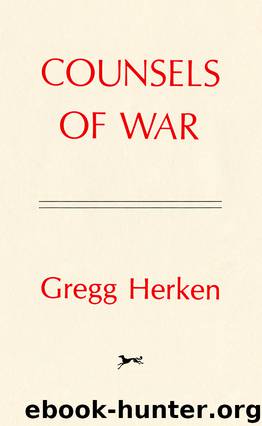Counsels of War by Gregg Herken

Author:Gregg Herken [Herken, Gregg F.]
Language: eng
Format: epub
ISBN: 978-1-101-94612-1
Publisher: Knopf Doubleday Publishing Group
Published: 2015-02-18T05:00:00+00:00
18
A Long Twilight Struggle
What seemed to be the alternative prospects of accidental war or surprise attack had preoccupied most of those who thought about nuclear war since the dawn of the atomic age. Which dread contingency was the greater danger had, indeed, become a major part of the defense debate—as the protracted feud between the strategists and the scientists showed. By the mid-1960s the possibility that a nuclear war might begin and develop like a conventional war, becoming a protracted conflict, seemed by contrast an isolated and lonely obsession of analysts like Bernard Brodie at Rand. The almost exclusive concern elsewhere was with how a nuclear war might begin—not with how it might be fought or brought to an end. Behind this narrow view was the all-but-unchallenged assumption of the time that such a war would be both brief and world-ending.
For a small group of nuclear strategists, however, the lack of consideration given to what might happen after the outbreak of a nuclear war represented a peculiar gap in the thinking of their colleagues. To Herman Kahn, this oversight had seemed a strategic lacuna of grand proportions at Rand—one he self-consciously set out to avoid at Hudson. Part of the fixation of Rand’s analysts with the causes of war, Kahn believed, was explained by the dramatic but historically exceptional case of Pearl Harbor. Kahn felt that the complex and tangled roots of the First World War had also discouraged strategists from studying how war might develop gradually, inexorably—but also more plausibly—from something like a minor diplomatic crisis.
“We used World War One as an example of a scenario that would never pass anybody’s examination,” Kahn said of a study begun at Hudson on the origins of war. The results had underscored the unpredictability of events as well as of human behavior. “There were at least eight instances that would never pass anybody’s examination,” Kahn remembered, “including, for example, the Kaiser signing a blank check and then going on vacation.” The implausibility of the historical record before Pearl Harbor—and the shock that event would have upon the American psyche—had made it difficult, he believed, to imagine a war that did not begin with a sneak attack. (When Kahn asked two new recruits at Hudson to consider how a nuclear war between the United States and Russia might be terminated, the duo had returned after thirty minutes complaining that they could find no convincing way to get such a war started. Kahn suggested a Soviet invasion of West Germany as “the least implausible” casus belli.)
Another reason for the strategists’ blind spot concerning the conduct of a nuclear war, Kahn claimed, was the unwillingness they shared with the general populace to look the specter directly in the eye—in his phrase, “to think about the unthinkable”: “The reason why the level of understanding was so low is that nobody was willing to take the subject seriously.”
The unreality of the strategists’ world was dramatically made clear to Kahn by the results of an informal poll that he, Thomas Schelling, and another colleague from Rand had taken of their colleagues there in 1960.
Download
This site does not store any files on its server. We only index and link to content provided by other sites. Please contact the content providers to delete copyright contents if any and email us, we'll remove relevant links or contents immediately.
| Africa | Americas |
| Arctic & Antarctica | Asia |
| Australia & Oceania | Europe |
| Middle East | Russia |
| United States | World |
| Ancient Civilizations | Military |
| Historical Study & Educational Resources |
The Radium Girls by Kate Moore(12013)
100 Deadly Skills by Clint Emerson(4917)
Rise and Kill First by Ronen Bergman(4776)
The Templars by Dan Jones(4681)
The Doomsday Machine by Daniel Ellsberg(4482)
The Rape of Nanking by Iris Chang(4200)
Killing England by Bill O'Reilly(3994)
Stalin by Stephen Kotkin(3956)
Hitler in Los Angeles by Steven J. Ross(3937)
12 Strong by Doug Stanton(3541)
Hitler's Monsters by Eric Kurlander(3327)
Blood and Sand by Alex Von Tunzelmann(3192)
The Code Book by Simon Singh(3175)
Darkest Hour by Anthony McCarten(3117)
The Art of War Visualized by Jessica Hagy(3000)
Hitler's Flying Saucers: A Guide to German Flying Discs of the Second World War by Stevens Henry(2744)
Babylon's Ark by Lawrence Anthony(2671)
The Second World Wars by Victor Davis Hanson(2521)
Tobruk by Peter Fitzsimons(2504)
